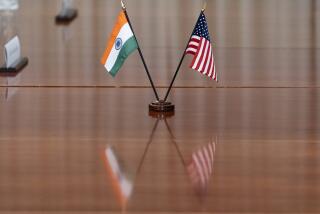India executes Afzul Guru for 2001 parliament attack
- Share via
NEW DELHI -- India executed Mohammad Afzal Guru on Saturday, an Indian national from divided Kashmir convicted of providing logistical support for a notorious 2001 attack on parliament that killed at least seven people and fanned regional tension.
Authorities hoped this would put an end to a painful chapter in the country’s history but braced for violence, erecting barriers, deploying hundreds of security forces and slapping a curfew on parts of Kashmir. Residents of the disputed region, which has had a separatist insurgency for decades, learned of the restrictions through mosque announcements made during morning prayers.
Guru’s hanging, India’s preferred method of execution, took place at Delhi’s Tihar Jail without warning or fanfare early Saturday morning. His body, which his family has no right to retrieve under Indian law, will be buried in accordance with Islamic rituals inside the prison grounds.
“This is only about the law taking its course,” Home Secretary R.K. Singh told reporters. “We followed the jail manual and his hanging took place today.”
During the attack on Dec. 13, 2001, five militants stormed New Delhi’s well-guarded parliament armed with guns and grenades but were killed before getting into the main hall. Most of the seven casualties from the 30-minute fire fight were policemen or related security officials along with a gardener.
Guru, arrested a few days later, was convicted of sheltering and helping the militants secure weapons and was handed the death penalty in 2004. The middle-class student, who was studying for his civil service exam, denied any role in the conspiracy, and a scheduled 2006 execution was delayed after his wife filed a petition arguing that there was no direct evidence linking him to the attack.
Several human rights groups and political parties argued that Guru didn’t get a fair trial in the rush to blame. A final clemency appeal to President Pranab Mukherjee late last month was rejected, local media reported, leading to Saturday’s hanging.
India accused Pakistan at the time of being responsible for the brazen attack through Jaish-e-Mohammad, a militant group it said was a proxy for the government. Islamabad denied any involvement, but tension mounted as the nuclear-armed neighbors mobilized nearly a million soldiers, bringing the wary rivals to the brink of their fourth war. Eventually several months later, tensions dissipated.
India and Pakistan each control part of Kashmir, divided by a heavily armed Line of Control. They’ve fought two wars over the region, which they both claim in full.
The Congress Party-led government, which faces a tough reelection battle in 2014 amid corruption scandals, a weak economy and high inflation, has been accused by political opponents of dragging its feet in the fight against terrorism.
Gujarat Chief Minister Narendra Modi, a controversial high flier in the main opposition Bharatiya Janata Party, tweeted Saturday that the decision to hang Guru was “better late than never.”
But government officials said politics didn’t play a role in the timing of the execution.
Tanvi Sharma in the New Delhi bureau contributed to this report.
More to Read
Sign up for Essential California
The most important California stories and recommendations in your inbox every morning.
You may occasionally receive promotional content from the Los Angeles Times.













